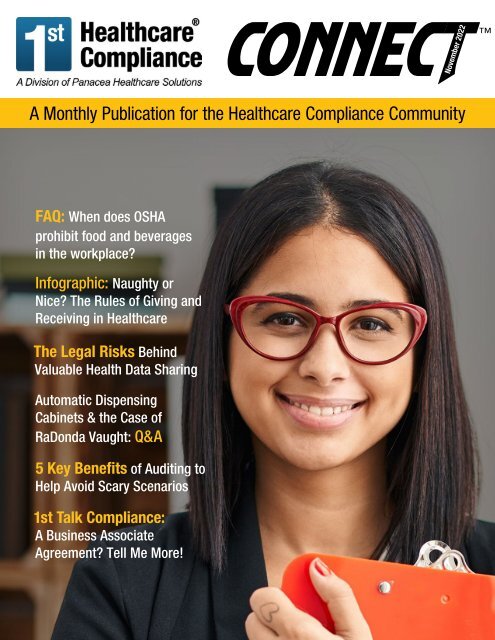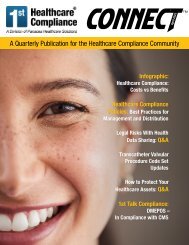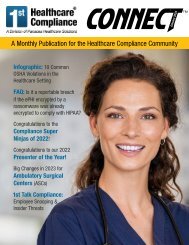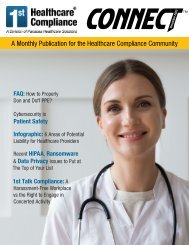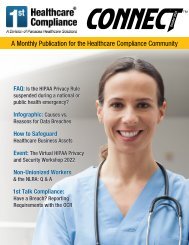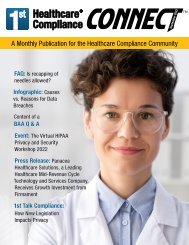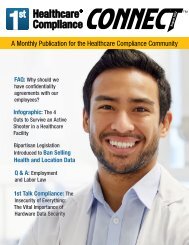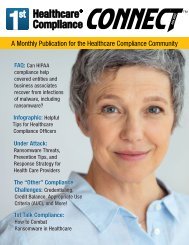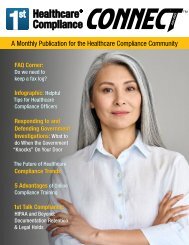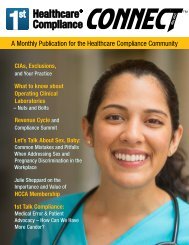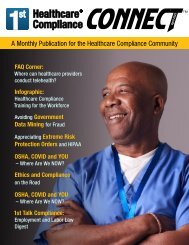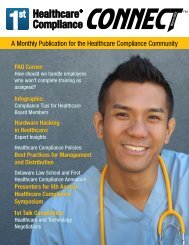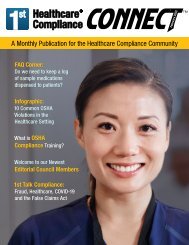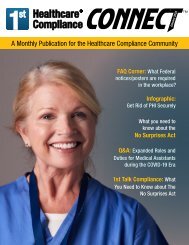First Healthcare Compliance CONNECT November 2022
Create successful ePaper yourself
Turn your PDF publications into a flip-book with our unique Google optimized e-Paper software.
<strong>CONNECT</strong><br />
<strong>November</strong> <strong>2022</strong><br />
<br />
A Monthly Publication for the <strong>Healthcare</strong> <strong>Compliance</strong> Community<br />
FAQ: When does OSHA<br />
prohibit food and beverages<br />
in the workplace?<br />
Infographic: Naughty or<br />
Nice? The Rules of Giving and<br />
Receiving in <strong>Healthcare</strong><br />
The Legal Risks Behind<br />
Valuable Health Data Sharing<br />
Automatic Dispensing<br />
Cabinets & the Case of<br />
RaDonda Vaught: Q&A<br />
5 Key Benefits of Auditing to<br />
Help Avoid Scary Scenarios<br />
1st Talk <strong>Compliance</strong>:<br />
A Business Associate<br />
Agreement? Tell Me More!
Got a Minute? Please Rate Us!<br />
The health of our company depends on the members<br />
of our community spreading the word about us.<br />
Share Your Success Story<br />
An endorsement by you is the greatest compliment<br />
we could receive! Please take a moment of your time<br />
to rate us online so that others can benefit from your<br />
experience. It’s a simple way to help us grow and<br />
improve.<br />
We appreciate your support and look forward to<br />
hearing from you!<br />
In This Issue:<br />
FAQ: When does OSHA prohibit food and<br />
beverages in the workplace?<br />
The Legal Risks Behind Valuable Health Data<br />
Sharing<br />
Infographic: Naughty or Nice? The Rules of<br />
Giving and Receiving in <strong>Healthcare</strong><br />
Automatic Dispensing Cabinets & the Case of<br />
RaDonda Vaught: Q&A<br />
2<br />
Panacea <strong>Healthcare</strong> Solutions LLC © <strong>2022</strong>
<strong>Compliance</strong> Super Ninja <br />
Jack Crystle<br />
Manager, Christiana Cosmetic Surgery<br />
How would you describe your experience with <strong>First</strong> <strong>Healthcare</strong> <strong>Compliance</strong>?<br />
It has been very good, providing me with the necessary training and also helps me in maintaining employee<br />
records.<br />
What do you enjoy most about working with Christiana Cosmetic Surgery?<br />
My favorite thing about working at Christiana Cosmetic Surgery is having a dependable and loyal staff.<br />
Would you rather have an unlimited international first class ticket or never have to<br />
pay for food at restaurants? Why?<br />
Unlimited international travel. Why? I would prefer to see some countries that we haven’t visited.<br />
5 Key Benefits of Auditing to Help Avoid Scary<br />
Scenarios<br />
1st Talk <strong>Compliance</strong>: A Business Associate<br />
Agreement? Tell Me More!<br />
Contact Toll Free: 888-54-FIRST 3
FAQ Corner<br />
When does OSHA prohibit food and beverages in the workplace?<br />
OSHA’s bloodborne pathogens standard, 29 CFR 1910.1030(d)(2)(ix), prohibits the consumption of food and<br />
beverages in work areas where there is a reasonable likelihood of occupational exposure to blood or other<br />
potentially infectious material (OPIM) takes place, or where the potential for contamination of work surfaces exists.<br />
This standard also prohibits storage of food or drink in refrigerators, freezers, shelves, cabinets or on countertops or<br />
bench tops where blood or OPIM are present.<br />
OSHA also prohibits consumption of food/beverages in any area exposed to a toxic material under its sanitation<br />
standard, 29 CFR 1910.141(g)(2). The term toxic material is defined as a “material in concentration or amount...<br />
which is of such toxicity so as to constitute a recognized hazard that is causing or is likely to cause death or serious<br />
physical harm.” In determining this, employers will need to review Safety Data Sheets (SDS) for hazardous materials<br />
in the work area.<br />
It is important for employers to evaluate the workplace to determine in which locations food or beverages may<br />
potentially become contaminated and must train and prohibit employees from eating or drinking in such areas.<br />
Explore the FAQs tab in your compliance solution<br />
to find answers to your compliance questions!<br />
CLIENT<br />
ALERT<br />
4<br />
Panacea <strong>Healthcare</strong> Solutions LLC © <strong>2022</strong>
The Legal Risks<br />
Behind Valuable<br />
Health Data<br />
Sharing<br />
Catherine Short<br />
Iliana L. Peters, Shareholder at Polsinelli<br />
PC will lead the complementary webinar,<br />
“Health Data, A Value Proposition: Legal Risks<br />
with Innovative Data Sharing Projects” on<br />
December 13, <strong>2022</strong> at 1 pm ET. Watch as<br />
Iliana discusses:<br />
• the scope and<br />
breadth of data<br />
sharing projects in<br />
development in the<br />
health care sector<br />
• contractual, state,<br />
federal, and<br />
international legal<br />
obligations for data<br />
privacy and security<br />
for such projects<br />
• issues related to data ownership that may also<br />
be part of such projects<br />
These days, data is more valuable than oil. And<br />
health data is the most valuable of all data!<br />
Companies of all types should consider the legal<br />
risk with data valuation, data ownership, and data<br />
sharing agreements. Data sharing projects take<br />
many forms and address many important issues,<br />
including improvements in patient safety, fraud and<br />
abuse, population health, research, and costs to the<br />
health care system. That said, the contractual, state,<br />
federal, and international regulatory requirements<br />
applicable to such data sharing projects are<br />
significant.<br />
Health care entities may be particularly vulnerable to<br />
legal risk related to data sharing projects involving<br />
health data. Specifically, health care entities should<br />
consider contractual obligation, HIPAA, state privacy<br />
laws, and other requirements, as well as discuss<br />
risk assessment, data sharing agreements, key<br />
provisions, and business associate relationships.<br />
The presentation offers best practices for these<br />
important issues and projects. Sign up for Iliana’s<br />
complimentary webinar here and earn valuable<br />
CEUs!<br />
Contact Toll Free: 888-54-FIRST 5
6<br />
Panacea <strong>Healthcare</strong> Solutions LLC © <strong>2022</strong>
Contact Toll Free: 888-54-FIRST 7
Automatic Dispensing<br />
Cabinets & the Case of<br />
RaDonda Vaught: Q&A<br />
Catherine Short<br />
Rachel V. Rose, JD, MBA, principal with Rachel<br />
V. Rose – Attorney at Law, P.L.L.C., Houston,<br />
TX, has a unique background, having worked in<br />
many different facets of healthcare, securities,<br />
cybersecurity, as well as international law and<br />
business throughout her career. Her practice<br />
focuses on a variety of cybersecurity, health care<br />
and securities law, False Claims Act and Dodd-<br />
Frank matters and issues related to compliance,<br />
transactional work, litigation as well as representing<br />
persons before government agencies. As a member<br />
of the <strong>First</strong> <strong>Healthcare</strong> <strong>Compliance</strong> Editorial Council,<br />
Rachel is a frequent presenter at educational events.<br />
For more information regarding this topic please<br />
view the related webinar for further discussion and<br />
learning.<br />
Below, Rachel answers some common questions<br />
and provides explanations related to the education<br />
surrounding Automatic Dispensing Cabinets, Patient<br />
Care, and the Case of Nurse RaDonda Vaught.<br />
Can you describe what exactly is an<br />
Automatic Dispensing Cabinet and what<br />
does it hold?<br />
Fundamentally, an Automated Dispensing Cabinet,<br />
which is also known as an ADC, is essentially<br />
a drug storage device. It typically electronically<br />
dispenses medications or different types of scrubs,<br />
for example, or other items that you may see in<br />
the operating room or in the emergency room. The<br />
alleged benefit is to dispense these items in a<br />
controlled fashion in a way that normally integrates<br />
with an electronic health record system, or with a<br />
procurement software within a hospital, that then<br />
tracks the use and has almost a real-time data so<br />
that the staff can know when to replace or when a<br />
supporting traditional unit dose delivery system may<br />
need to be utilized.<br />
The other type of dispensing cabinet does not hold<br />
pharmaceuticals or drugs. Rather, it holds items that<br />
a nurse or a physician would use during surgery or<br />
in the emergency room such as sterile suture packs<br />
or gauze.<br />
What are some important things to know<br />
about an ADC?<br />
Medications are dispensed in a controlled fashion.<br />
ADCs are not new. In fact, they came in to being in<br />
the 1980s. And then by the 1990s, their use was<br />
very prevalent. Having said that, their safety and<br />
8<br />
Panacea <strong>Healthcare</strong> Solutions LLC © <strong>2022</strong>
efficacy began to be studied. And the studies that<br />
came out even 20-30 years ago, are still relevant<br />
today because of some of the safety and patient<br />
care issues that were highlighted at that time. For<br />
example, the mislabeling of drugs, the improperly<br />
filling of dispensing cabinets, the lack of safety<br />
record procedures, numbers of doses dispensed,<br />
and the ability to override system access tracking.<br />
Today, now more than ever, and especially with the<br />
advent of the HIPAA Security Rule, which has been<br />
in effect since 2005, and then we now have the<br />
HITECH Act, in effect, the HIPAA Omnibus Rule, and<br />
then we have other laws and the related regulations<br />
as well, such as the Cybersecurity Act of 2015,<br />
all of which espouse the requirements of having<br />
adequate technical, administrative, and physical<br />
safeguards.<br />
One of the most fundamental safeguards is user<br />
ID and unique user password. There should be for<br />
every individual accessing a cabinet, there needs to<br />
be an individual user ID and password. Alternatively,<br />
some types of these devices use a biometric or<br />
fingerprint. And from there, organizations really<br />
need to look at two-factor identification. These<br />
are areas which can create significant liability, not<br />
only from a cybersecurity standpoint, but more<br />
importantly, from a patient care standpoint, which is<br />
one of the issues in the RaDonda Vaught case.<br />
Tell me about the role of the Automatic<br />
Dispensing Cabinet and the facts of the<br />
RaDonda Vaught case?<br />
What’s interesting is that there was a quote that<br />
was made by her attorney that said, while it’s not<br />
all her fault, meaning all his client’s fault, there<br />
are some real systemic problems with the way a<br />
medical center dispenses medicine through the<br />
automated dispensing systems. And so, in this<br />
case unfortunately, the nurse, the defendant, did<br />
have personal errors. It wasn’t solely the fault of<br />
the ADC. However, there were a lack of technical,<br />
administrative, and physical safeguards, there was<br />
a lack of check and balance. And that led to Ms.<br />
Murphy the patient, dying as a result of this error.<br />
So, our players in this case are Ms. Murphy, the<br />
deceased patient, RaDonda Vaught, the nurse and<br />
defendant, Vanderbilt University Medical Center<br />
(“Medical Center”), the district attorney, who<br />
The Most Comprehensive<br />
<strong>Healthcare</strong> <strong>Compliance</strong> Course<br />
The Fundamentals is a user-friendly, four-module<br />
online course designed to help healthcare professionals<br />
understand the essential principles and practices of<br />
compliance.<br />
BUY COURSE NOW<br />
Contact Toll Free: 888-54-FIRST 9
prosecuted the case, CMS, which is the Centers of<br />
Medicare and Medicaid Services, the Tennessee<br />
Department of Health, the Tennessee Board of<br />
Licensing, both for health care facilities and for<br />
nursing, and then we also have the coroner’s office,<br />
as well as the Joint Commission.<br />
Can you tell us the story of what happened?<br />
RaDonda Vaught was a licensed nurse who began<br />
working at Vanderbilt University Medical Center<br />
in 2015. In late 2017, a patient Charlene Murphy,<br />
who was 75, checked into Vanderbilt with what is<br />
known as a subdural hematoma. This is essentially<br />
bleeding in her brain between the various layers<br />
of the brain. Anytime you have bleeding on the<br />
brain, this typically requires immediate attention.<br />
So, having said that, a couple of days later, her<br />
condition improves and she’s almost ready to be<br />
discharged from the medical center. As is common<br />
with this type of condition, a final scan is done in<br />
the radiology department just to make sure that<br />
there isn’t any new bleed or that everything is going<br />
according to plan. Now, it’s not uncommon for a<br />
patient to be given a sedative such as Versed for a<br />
closed MRI scan.<br />
However, the defendant Nurse Vaught accidentally<br />
gave a dose of vecuronium, which is in fact a<br />
powerful, paralyzing medication, it is not just a<br />
Risk Management Considerations for<br />
the <strong>Healthcare</strong> <strong>Compliance</strong> Officer:<br />
Training, Incident Management,<br />
Governing Boards, and<br />
Measures Unique to COVID-19<br />
It’s no secret that healthcare is one of America’s<br />
most heavily regulated industries with substantial<br />
fines and penalties for non-compliance. Complex<br />
regulations and mandates make compliance<br />
management a necessity.<br />
DOWNLOAD NOW<br />
10<br />
Panacea <strong>Healthcare</strong> Solutions LLC © <strong>2022</strong>
sedative that is given on a regular basis. What<br />
happened, unfortunately, was that the drug left the<br />
patient brain dead. Later that day, two neurologists<br />
from the medical center report the death to the<br />
Davidson County Medical Examiner. However,<br />
they did not mention the medication error, or the<br />
vecuronium. The death was attributed to bleeding in<br />
her brain and deemed to be natural, as bleeding in<br />
the brain was what she initially came in for. Based<br />
on information provided by the medical center,<br />
the medical examiner did not do an independent<br />
investigation into the death. That’s not uncommon,<br />
either unless there’s a reason, especially when it’s<br />
a renowned medical center, to dispute the findings<br />
or to probe further or if the family has a request that<br />
an autopsy be done. Normally, it is taken as natural.<br />
In January of 2018, in light of the death, the Medical<br />
Center took some significant actions first, they<br />
did not report to state or federal officials which is<br />
required by law that this had occurred. Secondly,<br />
defendant Vaught was fired by Vanderbilt University.<br />
And then subsequently, Vanderbilt negotiated a<br />
settlement with the descendant’s family. That<br />
primarily did three things: first, it gave them a<br />
monetary settlement; secondly, the settlement was<br />
not made publicly known, and lastly, there was a<br />
provision that required them not to speak publicly<br />
about the death or the medication error. Now having<br />
a confidential agreement under a situation where<br />
a patient either dies or has an adverse patient<br />
outcome, that constitutes at a minimum negligence<br />
is not unusual. But for their not reporting and not<br />
being completely truthful with the family about what<br />
happened, there was nothing ill or untoward about<br />
the settlement. So that happens in early 2018.<br />
By October of 2018, an anonymous person<br />
alerts state and federal health authorities to the<br />
unreported medication error that was responsible<br />
for the patient’s death. From there, we have<br />
different licensing boards begin to take interest and<br />
begin investigating. For example, the Tennessee<br />
Department of Health, investigated and decided<br />
not to pursue any disciplinary action against Nurse<br />
Vaught. In a letter to Vanderbilt the agency’s<br />
investigations director said Vaught’s case did<br />
not constitute a violation of the statutes or rules<br />
governing her profession, which is the nursing<br />
profession. And on the same day, the defendant<br />
Vaught was sent a letter saying this matter did not<br />
merit further action.<br />
CMS had a different response. And in fact, they<br />
came in to the Medical Center unannounced to do<br />
a surprise inspection. And the inspection did in fact<br />
confirm that the patient died from an accidental<br />
dose of vecuronium and that the Medical Center did<br />
not report the medication error to the government<br />
or to the medical examiner, according to an<br />
inspection report, and in late <strong>November</strong> 2018, the<br />
circumstances of the fatal medication error became<br />
public for the first time when CMS released their<br />
report. However, they did not identify the nurse or<br />
patient by name. And in fact, the Medical Center’s<br />
reimbursement for Medicare was threatened unless<br />
it could prove it took steps to prevent a similar error<br />
and to provide a correction plan, which it did. So<br />
that appeased the federal agency and its Medicare<br />
reimbursements were secured.<br />
In early 2019, the nurse was identified publicly for<br />
the first time when she was arrested on a criminal<br />
indictment for her alleged role in the death. Initially,<br />
she was charged with reckless homicide and<br />
impaired adult abuse. But Vanderbilt was not named<br />
as a codefendant, and Vanderbilt did not take<br />
any disciplinary action, nor did the board did not<br />
take any disciplinary action. That’s the Tennessee<br />
Board of Licensing, despite Vanderbilt purchasing<br />
the automatic dispensing cabinet that was utilized,<br />
despite it being responsible for the internal,<br />
technical, physical, and administrative safeguards<br />
being in place. And in light of, some of the issues<br />
that nurses dealt with on a regular basis.<br />
This is a large case. It seems like there were<br />
so many different players in it that could<br />
have been sued or prosecuted and I am<br />
surprised they were not.<br />
Right. So, at the beginning, I mentioned different<br />
Contact Toll Free: 888-54-FIRST 11
players in different proceedings that were going on.<br />
And we already heard about the Tennessee licensing<br />
board initially saying there’s no issue here. After<br />
things become more public, the Tennessee licensing<br />
board for health care facilities, says to Vanderbilt,<br />
you know what? We’re not taking any action here<br />
either. And that was after CMS came in. According<br />
to the court records, prosecutors revealed more<br />
details about the case. And first, the investigators<br />
allege that the nurse defendant made 10 separate<br />
errors when giving the wrong medication to Murphy,<br />
including, overlooking multiple warning signs that<br />
she had the wrong medication. Now, think back to<br />
that process I described in-between the pharmacy<br />
authorizing a drug to be dispensed and the patient<br />
receiving the drug. There are a lot of different steps<br />
both on the technical side and on the physical<br />
person side as well. The court records state that<br />
the nurse would have had to look directly at a<br />
warning saying, “Warning: paralyzing agent” before<br />
injecting the drug. Additionally, a difference between<br />
Versed. Versed does not need to be mixed. It’s just<br />
a suspension formula. But the other drug was a<br />
powder and required mixing and agitation before<br />
it could be administered. So, two very different<br />
drugs with very different purposes, one with a very<br />
pronounced warning, and a different mechanism as<br />
well before a drug could be injected. So that is very,<br />
very key.<br />
Now, about the same time or at least in 2019, at the<br />
request of law enforcement, the Nashville medical<br />
examiner reexamined the circumstances of the<br />
death. And the manner of death was changed from<br />
natural to accidental and the term accidental is<br />
critical because accidental, especially in criminal<br />
law has a very mitigating effect. So, in August of<br />
2019, we have this change on the death certificate.<br />
In September of 2019, The Tennessee Department<br />
of Health reverses its prior decision not to pursue<br />
professional discipline against Nurse Vaught. Again,<br />
this is the Tennessee Board of Nursing. The agency<br />
did not issue a statement as to why it reversed its<br />
prior decision. But reasonable minds would probably<br />
reach a conclusion that the amount of press, the<br />
number of documents that had been produced, and<br />
the changing in the coroner’s report did have an<br />
impact on that. So now we have what are known<br />
as a parallel proceeding. There is the criminal trial<br />
which is brought at the local level. In this case by<br />
the district attorney and a professional discipline<br />
hearing, a debate begins over which the case should<br />
first proceed.<br />
So here we have on December 15 of 2019, and<br />
a Tennessean Investigation. For those of you not<br />
familiar with Tennessee, The Tennessean is the<br />
main paper and media outlet in Nashville. They<br />
investigated how the actions taken by Vanderbilt<br />
officials obscured the circumstances of the death.<br />
And one of those circumstances was in fact, the<br />
ability for nurses and other medical professionals<br />
who could access the ADCs to in fact, circumvent<br />
that procedure. And this is important because we<br />
get through COVID and we fast forward to the<br />
July 2021, medical disciplinary hearing before the<br />
Tennessee licensing board. During her testimony,<br />
the defendant was forthright, she did not shirk<br />
her responsibility for the patient’s death, for her<br />
part of her role, saying it was her fault that she<br />
did not double check the medication and she<br />
took responsibility for that. However, her attorney<br />
indicated that a mistake was made, possibly<br />
because of flawed procedures at the Medical<br />
Center. And at the time, she attested that the<br />
Medical Center was struggling with a problem<br />
that prevented communication between its EHR,<br />
medication cabinets, and the hospital’s pharmacy. It<br />
was causing delays in dispensing and accessing the<br />
medications. So, the hospital short term workaround<br />
was to override those safeguards. Remember what<br />
I said before with the key, not using the unique user<br />
ID and password a key is one way to circumvent<br />
that there could also be a code that could be<br />
entered in the event of an emergency which would<br />
not require all that other information to be entered?<br />
So those are two ways that you can override it.<br />
In July of 2021, the Tennessee Board of Nursing<br />
revoked Nurse Vaught’s nursing license. Although<br />
board members appear sympathetic to her case,<br />
they do not overlook the errors. This is important<br />
12<br />
Panacea <strong>Healthcare</strong> Solutions LLC © <strong>2022</strong>
COVID-19 <strong>Healthcare</strong><br />
<strong>Compliance</strong> Updates<br />
In response to the global outbreak of the novel<br />
coronavirus disease (COVID-19), the Secretary<br />
of Health and Human Services declared a public<br />
health emergency on January 31, 2020. Federal<br />
agencies have taken action by issuing updates and<br />
guidance to navigate the crisis. This ebook provides<br />
healthcare providers with important developments<br />
and resources that impact federal healthcare laws.<br />
DOWNLOAD NOW<br />
because as we’ll see in the criminal case, and what<br />
happened at the sentencing, I believe the judge took<br />
a similar approach. Her trial began on March 21 of<br />
<strong>2022</strong>. And the trial ended with a jury finding her<br />
guilty of criminally negligent homicide and abuse<br />
of an impaired adult. Now if you recall, what the<br />
indictment was for reckless homicide, which is<br />
different. That’s an important distinction because for<br />
those of you who watch Law and Order or Boston<br />
Legal or any other legal show, you often hear the<br />
term scienter or mens rea, and that’s the required<br />
mental state. Once you start getting into intentional<br />
intent is that mens rea or scienter component, so all<br />
that is very important.<br />
Now we have the sentencing. And here we know<br />
that the jury found her guilty on two charges of<br />
criminally negligent homicide and the other abuse<br />
of an impaired adult. She, however, was sentenced<br />
to three years of supervised probation, but the<br />
sentencing guidelines could have given her up to<br />
eight years in prison. And the judge took an extra<br />
step and from my perspective, she took it for two<br />
reasons. <strong>First</strong>, the defendant took responsibility for<br />
her role in the unfortunate outcome. But additionally,<br />
the judge probably looked at what was going<br />
on with COVID, the exodus of people leaving the<br />
medical profession, and what these circumstances<br />
really warrant for someone who’s never encountered<br />
any issue before. Judge Smith, along with giving<br />
three years of probation, also issued a judicial<br />
diversion. And this is a program, in which first time<br />
offenders can have their records expunged, after<br />
completing their probation without any issues.<br />
This really gives Nurse Vaught the ability to move<br />
forward after she completes her three years of<br />
supervised probation, which given that she did have<br />
a role in this, is very reasonable.<br />
To your point, it is interesting that the Medical Center<br />
was not named because of the various issues that<br />
even CMS found so people can speculate all one<br />
wants, but I am choosing not to speculate as to why<br />
Vanderbilt was not named. And as you know, and as<br />
Contact Toll Free: 888-54-FIRST 13
people who have listened to me before, I obtained<br />
one of my degrees from Vanderbilt, but I do not<br />
represent them legally.<br />
At the end of any criminal case, the defendant has<br />
an opportunity to show remorse to the family, and<br />
the defendant expressly stated something along<br />
the lines of saying “I’m sorry, doesn’t seem like<br />
enough, but you deserve to hear that. And I am to<br />
know that I’m very sorry for what happened.” Now<br />
the patient’s family had a divergent reaction. And<br />
in fact, the family spokesman said that her mom<br />
would not have wanted the nurse to go to jail under<br />
these circumstances, because her mom was a very<br />
forgiving person, there was another family member<br />
who did want the defendant to go to prison. There<br />
was an outpouring of applause once the sentence<br />
was rendered by the judge, and a lot of those<br />
people who were outside, were, in fact, health care<br />
professionals. So that pretty much sums up the<br />
case.<br />
What are some key takeaways from the case<br />
from a compliance standpoint?<br />
Well, first and foremost, when you think about<br />
hospitals, the goal should be patient centered<br />
care and getting the best clinical outcomes for the<br />
patient. It comes down to making sure that the<br />
technical, administrative, and physical safeguards<br />
are in place across an entire organization. And<br />
when there is a requirement under law to be made<br />
to a governmental entity, make sure that you follow<br />
those requirements.<br />
Navigating Workplace<br />
Violence Prevention<br />
Under OSHA<br />
Workplace violence is a serious issue,<br />
especially in healthcare facilities. The<br />
OSHA workplace violence prevention<br />
guidelines help employees and<br />
employers alike by providing the<br />
necessary steps to maintain a safe<br />
work environment.<br />
DOWNLOAD NOW<br />
14<br />
Panacea <strong>Healthcare</strong> Solutions LLC © <strong>2022</strong>
Physician Auditing and <strong>Compliance</strong><br />
Many practitioner audits fall short of best practices.<br />
The modern healthcare environment and complex<br />
goals for compliance require time, expertise, and<br />
attention to detail. Ideally, audits occur at regular<br />
intervals and identify incidents and patterns of<br />
potential billing and coding risk. There are also some<br />
surprising upsides of professional audits that include<br />
greater visibility of under-coding.<br />
What are the benefits of auditing in a<br />
medical organization?<br />
Key Benefits of Auditing<br />
• Improve documentation/coding skills<br />
• Provide focused education in-person, online,<br />
remotely, or in combination<br />
• Ensure you are auditing the right practitioners<br />
and cases<br />
• Find cases with the highest probability for over<br />
and under coding for practitioners using datamining<br />
tools<br />
• Improve practitioners’ knowledge of E&M and<br />
documentation requirements<br />
Avoid Scary Scenarios with Expert<br />
Auditing Help<br />
Auditing is a daunting task, and every situation is<br />
unique, but with the right partners and tools in place<br />
you can gain visibility and understanding to increase<br />
collaboration and understanding among your team.<br />
If you’re ready to feel more confident, please get<br />
in touch with our experts at Panacea <strong>Healthcare</strong><br />
Solutions. Our innovative approach leverages our<br />
proprietary technology, predictive analytics, and the<br />
expertise of our auditing team to help you apply the<br />
right tools for your unique situation.<br />
Contact Toll Free: 888-54-FIRST 15
Referral<br />
Appreciation<br />
Program<br />
Receive a $50 gift card*<br />
when you refer a client!<br />
<strong>First</strong> <strong>Healthcare</strong> <strong>Compliance</strong> is delighted to offer<br />
a Referral Appreciation Program to say thank you<br />
for helping us to continue to grow. For each new<br />
1st Professional or 1st Premium client originating<br />
from a referral, <strong>First</strong> <strong>Healthcare</strong> <strong>Compliance</strong> will<br />
provide a $50 gift card as a token of appreciation.<br />
LEARN MORE<br />
16<br />
Panacea <strong>Healthcare</strong> Solutions LLC © <strong>2022</strong>
hosted by Catherine Short<br />
1st Talk <strong>Compliance</strong> features guest Rachel V. Rose, JD, MBA, principal with Rachel V. Rose – Attorney at<br />
Law, P.L.L.C., Houston, TX, on the topic of “A Business Associate Agreement? Tell Me More!” Rachel joins<br />
our host Catherine Short to discuss how Business Associate Agreements (BAA) are not new; however, some<br />
individuals are new to healthcare and others never understood what a BAA is exactly. A BAA is a contract that<br />
fundamentally gives assurances that the parties are complying with the Security Rule and Privacy Rule, setting<br />
parameters in the event of a reportable security incident or a breach, and states how the sensitive data will be<br />
returned and destroyed at the end of the relationship. Some of the items in a BAA are required, while others<br />
are optional but common. This presentation not only seeks to dispel myths about why certain language is<br />
prevalent in nearly all BAAs, but also provides insight into other provisions, and items for consideration, in light<br />
of the 21st Century Cures Act.<br />
Listen weekdays at<br />
7:30am, 3:30pm, 11:30pm ET<br />
Check out our Show Page!<br />
Looking for the latest compliance insights?<br />
Subscribe to our feed and don’t miss a thing!<br />
Contact Toll Free: 888-54-FIRST 17
COVID-19 <strong>Healthcare</strong><br />
<strong>Compliance</strong> Toolkit<br />
<strong>Healthcare</strong> compliance amidst COVID-19 presents new challenges for<br />
hospitals and healthcare providers. At top importance is the question<br />
of how to slow or stop the spread of COVID-19, while ensuring that your<br />
organization stays compliant.<br />
Now more than ever, your compliance department needs to have the necessary tools<br />
to help track, analyze, and respond to compliance challenges. To help navigate the<br />
process, we’ve gathered our best COVID-19 resources below. If you need further<br />
assistance, please contact us here.<br />
VIEW TOOLKIT<br />
18<br />
Panacea <strong>Healthcare</strong> Solutions LLC © <strong>2022</strong>
WORD SEARCH<br />
I O S E W M E W L C C M B F Z E L S I T<br />
T Z P E B E D U C A T I O N A L K A D S<br />
N U D Y T V C E P X D D L H Z U K Y O C<br />
Y D C D L T B N R N M I B U S I N E S S<br />
Z C V I P B L H A C R I S G J C Q D U A<br />
K R A Y T O F E R I X L K P C F R Q M X<br />
H S W T J A Q C M M L N J O E A T Q L T<br />
A T Q I B F M T O E N P I E U N W J X D<br />
B N Y R T Q V O N H N T M G Y K S I K M<br />
M E P U D F W W T E H T E O N O T I T W<br />
H M Y C E Z G I U U M F Y K C W S Q N W<br />
Z U W E V F Z O A N A T D C F C P U N G<br />
A C M S G T S K V S H I R L X A Q E K K<br />
K O E R I M V M O V Y S L A T I P S O H<br />
I D D E W C G I C C K C M A P M D T Z L<br />
E F I B Y Y H T E V G W X H Z E H I S V<br />
R B C Y V L H E A L T H C A R E D O W H<br />
K G A C D F I E X O L Z H W F J B N R T<br />
T L L G O V E R N M E N T N S S Y S C H<br />
F I W N D D J R G A Z H Q E Z X I L A M<br />
HOSPITALS SAFEGUARDS CYBERSECURITY<br />
BUSINESS COMPLIANCE GOVERNMENT<br />
HEALTHCARE EDUCATIONAL QUESTIONS<br />
DISPENSING AUTOMATIC MEDICAL<br />
SETTLEMENT DEPARTMENT DOCUMENTS<br />
Contact Toll Free: 888-54-FIRST 19
Upcoming and On-Demand Webinars<br />
Training<br />
DEC 13, <strong>2022</strong><br />
ON DEMAND<br />
ON DEMAND<br />
ON DEMAND<br />
ON DEMAND<br />
Health Data, A Value Proposition: Legal Risks with<br />
Innovative Data Sharing Projects<br />
Preserving and Protecting Assets In <strong>Healthcare</strong><br />
Automatic Dispensing Cabinets, Patient Care, & the<br />
Actual Sentence in the RaDonda Vaught Case<br />
The Dobbs Opinion, the Repealing of Roe, & the Impact on<br />
the Privacy & Security of Patient Information<br />
Workplace Civility: What Non-Unionized Employers Need<br />
to Know to Navigate the NLRA<br />
Register<br />
All Upcoming Webinars<br />
All On Demand Webinars<br />
IMPORTANT<br />
In the interest of your security, login credentials are<br />
for individual use only and not to be shared. Please<br />
contact Client Services if you require additional<br />
manager level users and/or if there has been a change<br />
in contact information.<br />
NEW FEATURES!<br />
Employee Zone/<strong>Compliance</strong> Detail<br />
Initial Data - Free text comment field has been added.<br />
COVID Vaccination Status - Additional fields have<br />
been added for Second Booster<br />
COVID Vaccination Status/ COVID Testing -<br />
Additional fields have been added to assist<br />
you with tracking COVID vaccination and<br />
CLIENT<br />
ALERT<br />
COVID Testing. Contact Client Services if you have any questions<br />
or would like to turn COVID alerting off.<br />
Training Zone - Employee Activated Status has been added to the<br />
Training Zone landing page view.<br />
Employee Incident Reporting - This new feature will provide<br />
the option for Employees to open/create an Incident Report.<br />
When employee incident reports are created you can review,<br />
update, track and manage them within the Incident Reporting<br />
Zone. Contact Client Services if you are interested in adding this<br />
additional feature to your Incident Reporting Zone.<br />
Join us on Social Media!<br />
Contact our Client Services Team with your questions!<br />
888.54.FIRST or clientservices@1sthcc.com<br />
20<br />
Panacea <strong>Healthcare</strong> Solutions LLC © <strong>2022</strong>


